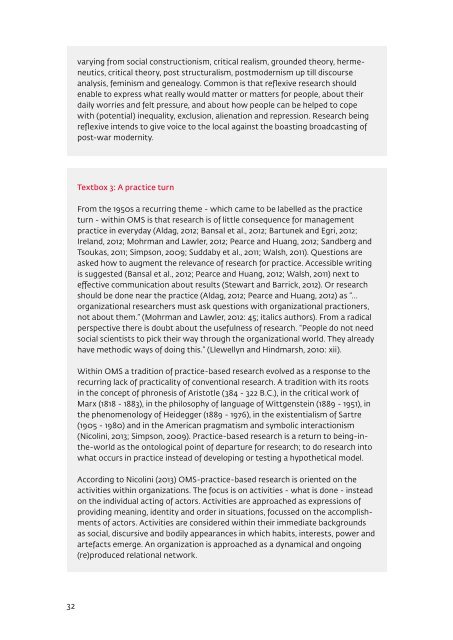Rumbling on performativity_Frits Simon
Rumbling on performativity_Frits Simon
Rumbling on performativity_Frits Simon
You also want an ePaper? Increase the reach of your titles
YUMPU automatically turns print PDFs into web optimized ePapers that Google loves.
varying from social c<strong>on</strong>structi<strong>on</strong>ism, critical realism, grounded theory, hermeneutics,<br />
critical theory, post structuralism, postmodernism up till discourse<br />
analysis, feminism and genealogy. Comm<strong>on</strong> is that reflexive research should<br />
enable to express what really would matter or matters for people, about their<br />
daily worries and felt pressure, and about how people can be helped to cope<br />
with (potential) inequality, exclusi<strong>on</strong>, alienati<strong>on</strong> and repressi<strong>on</strong>. Research being<br />
reflexive intends to give voice to the local against the boasting broadcasting of<br />
post-war modernity.<br />
Textbox 3: A practice turn<br />
From the 1950s a recurring theme - which came to be labelled as the practice<br />
turn - within OMS is that research is of little c<strong>on</strong>sequence for management<br />
practice in everyday (Aldag, 2012; Bansal et al., 2012; Bartunek and Egri, 2012;<br />
Ireland, 2012; Mohrman and Lawler, 2012; Pearce and Huang, 2012; Sandberg and<br />
Tsoukas, 2011; Simps<strong>on</strong>, 2009; Suddaby et al., 2011; Walsh, 2011). Questi<strong>on</strong>s are<br />
asked how to augment the relevance of research for practice. Accessible writing<br />
is suggested (Bansal et al., 2012; Pearce and Huang, 2012; Walsh, 2011) next to<br />
effective communicati<strong>on</strong> about results (Stewart and Barrick, 2012). Or research<br />
should be d<strong>on</strong>e near the practice (Aldag, 2012; Pearce and Huang, 2012) as “…<br />
organizati<strong>on</strong>al researchers must ask questi<strong>on</strong>s with organizati<strong>on</strong>al practi<strong>on</strong>ers,<br />
not about them.” (Mohrman and Lawler, 2012: 45; italics authors). From a radical<br />
perspective there is doubt about the usefulness of research. “People do not need<br />
social scientists to pick their way through the organizati<strong>on</strong>al world. They already<br />
have methodic ways of doing this.” (Llewellyn and Hindmarsh, 2010: xii).<br />
Within OMS a traditi<strong>on</strong> of practice-based research evolved as a resp<strong>on</strong>se to the<br />
recurring lack of practicality of c<strong>on</strong>venti<strong>on</strong>al research. A traditi<strong>on</strong> with its roots<br />
in the c<strong>on</strong>cept of phr<strong>on</strong>esis of Aristotle (384 - 322 B.C.), in the critical work of<br />
Marx (1818 - 1883), in the philosophy of language of Wittgenstein (1889 - 1951), in<br />
the phenomenology of Heidegger (1889 - 1976), in the existentialism of Sartre<br />
(1905 - 1980) and in the American pragmatism and symbolic interacti<strong>on</strong>ism<br />
(Nicolini, 2013; Simps<strong>on</strong>, 2009). Practice-based research is a return to being-inthe-world<br />
as the <strong>on</strong>tological point of departure for research; to do research into<br />
what occurs in practice instead of developing or testing a hypothetical model.<br />
According to Nicolini (2013) OMS-practice-based research is oriented <strong>on</strong> the<br />
activities within organizati<strong>on</strong>s. The focus is <strong>on</strong> activities - what is d<strong>on</strong>e - instead<br />
<strong>on</strong> the individual acting of actors. Activities are approached as expressi<strong>on</strong>s of<br />
providing meaning, identity and order in situati<strong>on</strong>s, focussed <strong>on</strong> the accomplishments<br />
of actors. Activities are c<strong>on</strong>sidered within their immediate backgrounds<br />
as social, discursive and bodily appearances in which habits, interests, power and<br />
artefacts emerge. An organizati<strong>on</strong> is approached as a dynamical and <strong>on</strong>going<br />
(re)produced relati<strong>on</strong>al network.<br />
32



